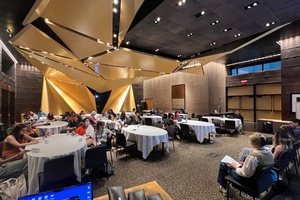Features:
Ms. Management: The Hard Work of Hiring Well
Rethinking hiring begins with the very first interview
There are many stories reporters and editors like to tell ourselves about our competencies, and one of them goes something like this: “I ask questions for a living, so that must mean I’m good at interviewing people for jobs.”
Alas, no.
Most of us are terrible interviewers. And it’s not just because of all the usual blind spots and biases of which we are more or less aware. It’s also because the way we typically conduct job interviews is, at best, an ineffective means of assessing whether a potential candidate would adequately perform in a given role.
I’m talking here about the unstructured interview, described in 2013 by researchers at Yale and Carnegie Mellon as “[asking] different questions of different applicants in whatever way [the interviewer] saw fit”. That research, recently highlighted in the New York Times, concluded that not only do unstructured interviews “not provide incremental validity, [there is] direct evidence that they can harm accuracy.”
Jason Dana, an assistant professor of management and marketing at the Yale School of Management and one of the authors of the 2013 study, suggests structuring interviews so all candidates are asked the same questions, “a procedure that has been shown to make interviews more reliable and modestly more predictive of job success.” He would also do away with “idly chatting or asking personal questions,” in favor of assessments that measured job-related skills. This has the bonus side effect of minimizing the likelihood that we rate someone a “good fit” merely because they grew up in the same town that we did, or share our taste in HBO original series.
Toward a Better Process
But let’s pause for a moment and unpack this. Asking each candidate the same questions assumes that we’ve prepared questions in advance, and that we’ve briefed every person on the interview panel about this approach. This demands a level of preparation not typically found in newsrooms, where editors are often tapped on the shoulder, handed a resume, and told, “I’ve got a candidate over there who’s applied for a position on the breaking news desk—could you talk to her for 20 minutes and tell me what you think?”
And let’s say we have, somehow, had the foresight and time to prepare questions in advance and then provide them to our panel. Will we also have drafted guidelines on how to assess responses to those questions? Did we make it clear that we expect and indeed will require written feedback on the candidates? Did we design and provide a rubric for feedback that weighted relevant skills and experience more heavily than snap judgements about personality and “culture fit”? Will we have even told the people doing the interviewing what the job is?
And once we’ve done all this, will we have kept good and accessible records about who interviewed whom? Will we have recorded whether there were any patterns in their candidate feedback, or whether their assessments tended to be outliers one way or another so that we could calibrate the overall feedback pool accordingly?
Because if we have taken all these steps, then what we have assembled begins to resemble a good interview process. And it is not one that looks much like the usual “so tell me more about your background?”questions that we ask because we’ve barely had time to glance at a cover letter before being hurried into the conference room.
Investing in Interviewing
Hiring is hard. Hiring well is even harder. We give outsized weight to interviews, considering how little we to tend prepare for them.
To be more effective as interviewers, we first need to acknowledge that we are our own worst enemies; as the Yale management expert put it, “people can’t help seeing signals, even in noise.” Then we need to take advantage of the resources that exist to help us ask better questions in a more consistent fashion. Perhaps we might even be motivated to convince our HR departments to invest in software that helps with structuring and scheduling interviews. Or failing that, try asking members of your newsroom for their favorite interview questions and add them to a template that teams can adapt and use for the next round of hiring.
I’ve interviewed what must by now be dozens of candidates for many different roles in a couple of countries and for various organizations, and every time I go through this process I find ways to make it better for the candidate and more effective for the company. Which is another way of saying that I too have asked the dreaded question, “where do you see yourself in five years?” But it’s been a long time since I’ve fallen back on that one, not least because I find it impossible to answer. I prefer instead, “tell me about the last time you had to work with a difficult person, and how you dealt with that,” or “if you had been editing this morning’s newsletter, what would you have led with?” I guarantee that the responses you get to those kinds of questions will lead you down a more fruitful path.
Resources
- How ‘Culture Fit’ Can Be a Shield for Hiring Discrimination
- Belief in the Unstructured Interview: The Persistence of an Illusion
- Building an Interview Question Template
Do you have questions about newsroom management and leadership? Facing a tough editorial challenge? Submit your questions to Ms. Management.
Credits
-
 Stacy-Marie Ishmael
Stacy-Marie Ishmael
Stacy-Marie Ishmael is a writer, editor, and product manager.




